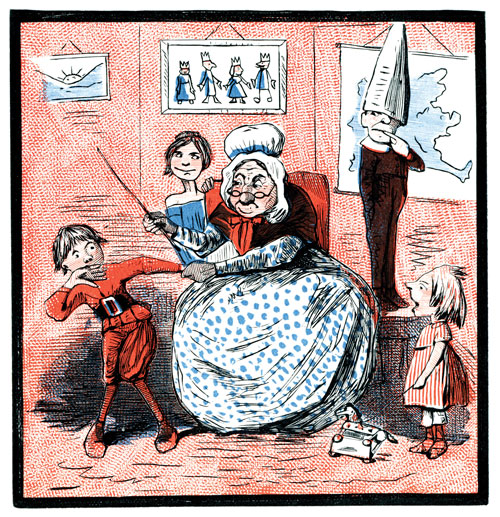There is a division running rife through the Schools Week office and it’s not just which radio station we should play as we work.
It’s the split between those who attended school when corporal punishment was still possible, and those who cannot believe that there was ever such a thing.
This is because the answer to the pub quiz question “In what year did England ban smacking in state schools?” is 1986. Way later than many people realise. Especially if they started school in 1987.
England didn’t ban corporal punishment in the independent sector until 1999 – the year that Britney Spears first entered the UK charts
You may also have noticed the “state” school caveat there. England didn’t ban corporal punishment in the independent sector until 1999. Which, for the sake of context, was the year that Britney Spears first entered the UK charts and the euro was introduced.
Not everyone was happy about the situation, though. The heads of a number of Christian fellowship independent schools appealed, at length, through various courts, for the ability to have delegated authority from parents to physically punish their children should they wish.
A BBC report from 2005 says the heads claimed that boys would be hit using “a thin, broad flat paddle to both buttocks simultaneously in a firm controlled manner”. Meanwhile, “girls could be strapped on the hand and then comforted by a member of staff and encouraged to pray”.
That’s 2005, by the way. The year Tony Blair won a historic third general election for New Labour and England finally managed to regain The Ashes (which, ironically, they had last won just as the smacking ban was introduced).

In the end, the campaigners lost, with judges deciding that no human rights were being denied if teachers couldn’t whack kids upside the head. Or anywhere else (whether on hand with comfort blankets or not).
Still, 1986 may not sound so bad as a time for such a change. I mean, in the 1980s we were still smoking on planes and driving leaded cars. That’s just how things were, right?
Wrong. Poland banned corporal punishment in schools in 1783, something that is still enshrined in the country’s constitution. Finland followed suit in the late 1800s. Even the Soviet Union gave it up by 1917.
So why is England so hit-thirsty? It’s not that the issue was never brought to attention. Professor Michael Freeman, an expert in children’s law, has written on several occasions of his discovery of a petition from 1669, presented to parliament, by a “lively boy” who was aggrieved at the “severities of school discipline of this nation”.
One can only speculate if these days he would be made into a hero or villain by the tabloid press.

We also shouldn’t take for granted that people won’t try to overturn the ban. In 1987, a year after its prohibition, Warren Hawksley, then MP for Halesowen and Stourbridge tabled an amendment to the Criminal Justice Bill to bring back “whipping” for “offenders” (including those under 14).
His rationale was that on a visit to the Isle of Man, which had retained corporal punishment, he noticed tourists would jokingly say to the police that they wouldn’t cause any trouble.
“It worked on the Isle of Man and it would work here,” he claimed at one point, during his lengthy speech. Perhaps it would. But given everywhere else has coped without it for more than 100 years it was probably just as well that his amendment fell.








In my first month as headteacher in January 1981, HMI with responsibility for Independent schools visited the school to feel my collar. He checked the school boundary, to make sure I knew it was secure, he checked the admissions register to ensure I knew how to admit and depart pupils, he checked the daily attendance register to ensure I monitored absence and its causes, and he checked that I kept a punishment book (normal quarto exercise book, nothing fancy) and wrote in it the details of the child, the reason and the number of strokes with a cane I had administered at one sitting. I was advised never to hit a child more than 6 times at a visit.
HMI passed over to me an leaflet advertising the supply of school rattan canes – he made it quite clear I could not use a garden bamboo from the greenhouse. Caning rapidly reduced during my first three years, as I had to navigate through the expectations of teachers whose weekly spellings and homework defaults were supported by such punishments.
I am a proud European but maybe this just goes to show that, sadly, we don’t deserve to be in the EU – we are a nation of barbarians! To truly put the tin lid on any ideas of european grandeur I might have had, my parents were both from the Isle of Man!! Still I’ll come in to my own, should the vikings stage another invasion!!
I and many of my friends where caned in school (in the isle of man) and now when I tell my children when I was your age I got caned for missing lessons or talking in class they look horrified. I now realise how wrong it was and how perverse the teachers giving the punishment where. I feel like making our government apologies for allowing this to go on so long. Especially after all the research into child abuse. I see the old teachers now and then and I can see the shame in their eye or it could be fear.
Corporal punishment should be brought back in some circumstances, but NEVER on hands! With the troubles with some pupils at some schools that you hear about on the News, the ‘namby pamby’ approach does not work with the really hard cases – female as well as male. Of course, such punishment should be used only as a last resort, and in the case of girls, not when they have their periods (but a week later in their cases). I was told of one Head who was so pathetic, he would say ‘Go away and sin no more’ but one boy was taken to the former Head who worked in the Junior School, who said the same thing, THEN gave the boy ‘6 of the very best’! That boy turned into one of the nicest young men I met at that school!
DKC
In my experience corporal punishment was abuse. My first school in Radcliffe, children were hit daily and frequently, I left this school when I was six, that is how young I was! On one occasion I had asked my teacher to go to the toilet, I was told to wait until after P.E. After P.E I was waiting for the teacher to ask again to go to the toilet (I was afraid of the repercussions if I went without permission!) when I wet myself. When the teacher came back she hit me on the bum repeatedly with a slipper. When I was older I researched into whether this was actually legal and was shocked to see that corporal punishment allowed teachers to ‘punish’ children so young for anything they felt a pupil had done wrong.
On another occasion I made a mistake in my work, I did not have a rubber and tried to rub it out with my finger as I was afraid of the teacher seeing the mistake. When she saw what I had done she made me sit on the narrow desk that had been set up against the wall with the hot pipes running under it. There was no room and this meant my legs were burnt by the pipe. I was frequently sent to this desk, I was age 6.
When I moved schools due to moving house I was terrified of the teachers. My new school did not use corporal punishment and I came to love school and not dread it.
I have a lot of anger towards 2 teachers that I remember from that school and feel I would not be the person I am today if I had not moved to a school where corporal punishment was not a thing. I believe that one of those teachers is now a head teacher and it concerns me that legal or not, they thought that punishment like that was the right thing to do and are still working with children!
Banning corporal punishment in schools was done on a local authority basis over a long period of time. Hard to remember the time when so much educational policy was left to the Lea!!
Let us face it the British just don’t like children. Men don’t like women. The British don’t like foreigners (well, they don’t speak English, do they?) The rich hate the poor, so all in all, a pretty sad state of affairs. Maybe in a few millennia we might have achieved some progress.
That is very true
Apart from my teaching job in England, while I was still a student, I taught for 42 years in Germany, where it was clear that any kind of corporal punishment would lead to dismissal. Other punishments may have been unfair and an abuse of authority, but I was more often than not in the position of warning parents about their physical mistreatment of their children. Generally speaking the relationship of teachers, parents and students is best based on mutual respect, not on the fear of physical punishment.
I am 67 years old and went to an all boys Grammar School in South Wales UK
The use of the bamboo rod was a daily fact of life.
Some teachers were frankly dangerous thugs who enjoyed it.
Sometimes the whole class was given the stick if just one boy stepped out of line.
The best day of my early life was when I left school.
I walked out on my 16th birthday.
The headmaster told me I would end up working in the local coalmine.
I educated myself , went to University obtained a BA,MA and then a Doctrate.
And became a University Lecturer.
Now retired.
Physical punishment mentally scared many boys for life.
Thankfully it is no longer and there are now strategies in place to help young people through the early years of becoming an adult without hitting them around the classroom!